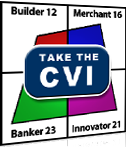Leadership character: The role of integrity
This piece is the second installment in a six-part series on leadership character by Col. Eric Kail.
Of all the facets of character, integrity might be the most critical – it builds valuable trust between people – and yet also the most esoteric. I’ve heard many sage leaders say, “Integrity is doing the right thing when no one is watching.” That definition relies too much on habit. I can be without integrity, yet trained to behave predictably in a certain manner. Of course, discipline is valuable; but I want to know that my hands are disciplined as a result of the integrity of my soul, not my ability to follow rules without thinking about them.
There are two critical components of integrity that go beyond just doing the right thing when no one is looking. The first is the adherence to a moral or ethical principle. This isn’t simple compliance to a rule; it implies a philosophical understanding of the reason it exists. The second is the pursuit of an undiminished state or condition. Everyone makes mistakes, so being a person of integrity does not mean you haven’t committed a moral or ethical violation, ever. It means having the strength of character to learn from those ‘misbehaviors’ and seek continual self-improvement.
The word ‘character’ is derived from the Greek word charattein, meaning to engrave. This provides a much richer understanding of integrity as something we can develop and strengthen, rather than as a glass ball handed to us that we try in vain not to drop. Our integrity is shaped by our most valuable life lessons, those that involved our deepest issues of honesty and motive. Integrity requires humble introspection, not self-righteous declaration. For instance, I may say without hesitation that I do not lie, cheat or steal; but have I ever attempted to deceive someone? I may in fact be lying to myself.
So before we can even embrace the notion of integrity, we need to develop the ability to intellectually wrestle with the urge to rationalize away our underlying faults and the related consequences. Intellectual ownership produces authenticity, and authenticity doesn’t suffer compartmentalization or rationalization. Our actions must mirror our words in all facets of life.
The engraving process that is the development of our character requires courage and transparency to forge this true integrity. My integrity is what it is today because of painfully valuable lessons with consequences, born from accountability to moral and ethical principles. I learned not to lie because of a lie I told when was young, one that had a consequence. Then, years after my integrity would not tolerate a simple lie, I improved on this lesson even further: I learned that satisfaction with a half truth is unacceptable when the whole truth can be won. This lesson was expensive yet so valuable, and I only understood it with the help of a mentor who taught me that integrity is not the absence of failure, it’s moving forward from it.
What are you doing to lead with and strengthen the integrity of those around you? Transparently telling your own story is a good place to start. And sharing how your character has developed and strengthened over time will help others to see past the false fear that their integrity is only as strong as the secrets they keep.
Col. Eric Kail is an Army field artillery officer who has commanded at the company and battalion levels. He is the course director of military leadership at the U.S. Military Academy at West Point. He holds a PhD in organizational psychology.
Disclaimer: The views expressed in this article are those of the author and do not reflect the official policy or position of the Department of the Army, Department of Defense or the U.S. Government.













